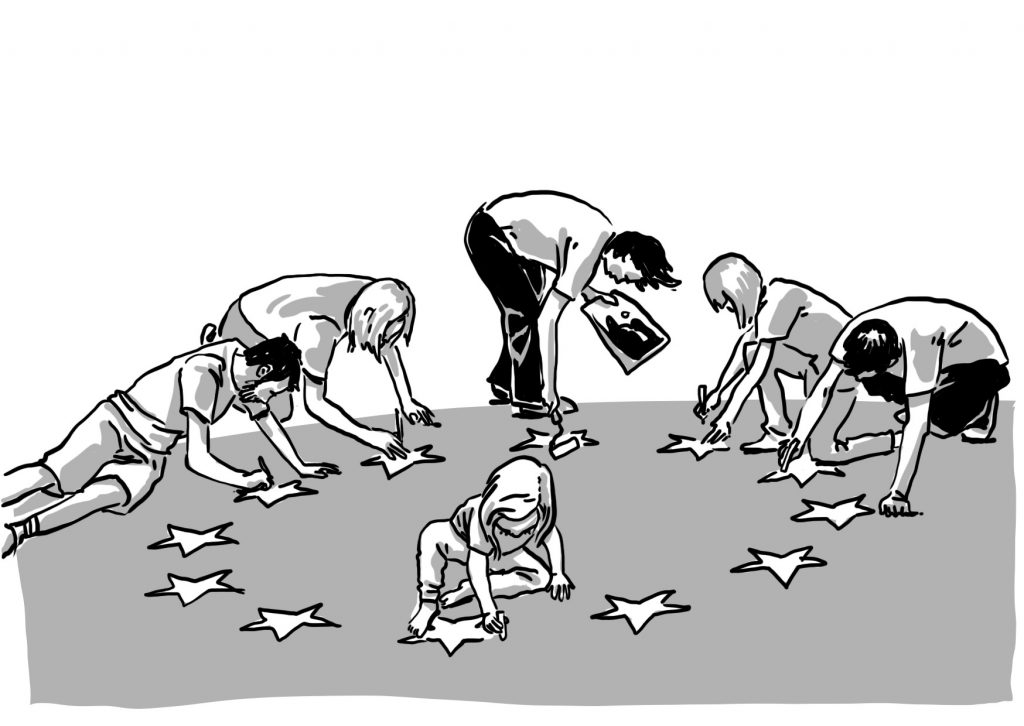Narratives matter, the way we portray history matters, and what we teach younger generations about old grievances matters. MIA student Luiza Leite de Queiroz wonders how a project that affects the lives of half a billion people can survive when the narratives of those eager to shred the European Union to pieces, are louder than the ones that envision its potential?
Earlier this year, in the run-up to the French presidential elections, German Minister for Foreign Affairs Sigmar Gabriel, alongside Emmanuel Macron and Jürgen Habermas, addressed an immensely plural auditorium in Berlin on the topic “Which future for Europe?”. In between bold statements and public commitments to the European Union, one particular message conveyed by the Minister struck a chord: policy is about narrative. Simple as that.
Policies are not – and should not be – crafted in a vacuum. Nor should they be implemented in a pristine aseptic environment. Narratives matter, the way we portray history matters, and what we teach younger generations about old grievances matters. The European project was born out of many aspirations and real needs, which makes the discourse of retreating on integration not only disheartening but extremely unfair to the project’s narrative.
The now widely promoted rhetoric that the EU is, above all, an extrinsic, power-seeking, self-serving creature is harmful, misleading and irresponsible. It clouds the average citizen’s judgement, discourages innovative solutions and dismisses all of the EU’s many achievements. It further misses the point by ignoring the fact that the European project is as much about economic integration as it is about preventing wars. Suggesting that the (almost) 25 years that have followed the Treaty of Maastricht have been enough of a shot at success that now the only way forward is backwards, is borderline cynical.
At this point of my argument, I have probably lost a few Eurosceptics – who are at best unimpressed, and at worse positively outraged –, which is not the reaction you’d want, should you be truly invested in trying to convince, rather than to antagonize them. The fact is, I get it, and anyone who has tried to understand the mechanics of the EU gets it: the European Union has many flaws – there is no denying that. So much so that even the ones who have been tasked with its promotion have been unable to reach out to the many peoples of Europe and explain the what’s and why’s of the EU.
A good starting point to fully grasp what the project is all about is Schuman’s declaration on how the aim of the [then] European Coal and Steel Community was to “make war between historic rivals France and Germany not merely unthinkable, but materially impossible“. The fact that the recent crisis in the Eurozone and the discrepancies between Member States’ economies has managed to completely overshadow, in people’s minds, the historical context that led to the creation of the European Community is not just understandable but arguably logical.
In the aftermath of the 2009 economic crisis, a mid-sized supermarket chain in Portugal advertised its products with the slogan “Missing the Escudo?”, referencing the Portuguese currency before the Euro and hinting at better (and cheaper) times, long since gone. Seven years later, when answering questions from the Eurobarometer (published in the spring of 2017), 74% of Portuguese respondents said that they were in favor of a European economic and monetary union with one single currency, the Euro. Public opinion being swayed by circumstance is not news, it’s just the rules of the game.
Lack of leadership, on the other hand, is extremely worrisome. How can a project that literally affects the lives of half a billion people survive when the voices that are eager to shred it to pieces are louder than the ones that envision its potential?
The democratic deficit and the lack of economic solidarity are real, and they must be dealt with. What is not real, is the idea that regaining that bit of sovereignty—shared with the EU a quarter of a century ago—will bring back times of prosperity. The EU does not need less integration; it needs better integration. It needs mending and creative resourcefulness.
Peace, and the welfare that it brings, are hardly quantifiable over time. There is no net benefit of peace, because peace is the ultimate benefit. The choice now rests essentially between fraternal disagreement within a framework that has already been put in place, and the option of business as usual: a few centuries of wars.
 Luiza Leite de Queiroz is a class of 2019 Master of International Affairs candidate at the Hertie School of Governance and currently interns with the GIZ (Deutsche Gesellschaft für Internationale Zusammenarbeit) in Lusaka, Zambia. Brazilian-born but Irish at heart, she holds a Bachelor’s degree in Law from the Federal University of Rio de Janeiro and a Master of Law degree (LL.M) in International and Comparative Law from Trinity College Dublin. A semester abroad spent at the University of Coimbra in Portugal ignited her passion for the European project and all things EU. She has previously done research work for the University of Cambridge (within the context of the DIGIWHIST project), London-based NGO Corruption Watch UK and Caritas. She has also worked at the Brazilian Federal Prosecution Service and as an associate lawyer at a law firm in Rio. She is a storyteller and, as such, loves a good anecdote. Her interests lie (mainly) in the intersections between human rights, anti-corruption movements, good governance and international and comparative law.
Luiza Leite de Queiroz is a class of 2019 Master of International Affairs candidate at the Hertie School of Governance and currently interns with the GIZ (Deutsche Gesellschaft für Internationale Zusammenarbeit) in Lusaka, Zambia. Brazilian-born but Irish at heart, she holds a Bachelor’s degree in Law from the Federal University of Rio de Janeiro and a Master of Law degree (LL.M) in International and Comparative Law from Trinity College Dublin. A semester abroad spent at the University of Coimbra in Portugal ignited her passion for the European project and all things EU. She has previously done research work for the University of Cambridge (within the context of the DIGIWHIST project), London-based NGO Corruption Watch UK and Caritas. She has also worked at the Brazilian Federal Prosecution Service and as an associate lawyer at a law firm in Rio. She is a storyteller and, as such, loves a good anecdote. Her interests lie (mainly) in the intersections between human rights, anti-corruption movements, good governance and international and comparative law.
